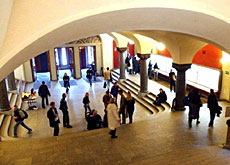New baccalaureate exam lands on the desk

Switzerland has taken eight years to implement a new baccalaureate exam - the test that opens the door to higher education in Switzerland.
By most accounts, reforms are bearing fruit, but supporters and detractors will have to wait till autumn for a comprehensive review of how the new exam is working.
Every year between June and September, thousands of students endure sleepless nights and 11th-hour cramming sessions preparing for the baccalaureate.
For them, the new test is unlikely to ease the pressure – the failure rate has actually risen since it was introduced in a number of cantons in 2001.
A 200-page report – due at the end of autumn – will mark the success, or otherwise, of the new exam.
Nine subjects
The new baccalaureate is made up of nine subjects, of which the candidates are allowed to select two which they will study to a higher level. The previous exam covered 11 subjects.
Candidates are also expected to submit a dissertation on an aspect of one of the subjects they are studying.
The new test has also changed things for teachers. The designers favoured allowing students to “shape” the exam – hence the right to choose two of the subjects – but they also suggested that teachers adapt the way they prepare school-leavers for the test.
Less “teaching” and more “coaching”, better integration of disciplines and new branches of learning, were the suggestions.
Post-mortem
The exam will be evaluated in two stages by a working group set up by the federal and cantonal governments for that purpose.
“A revision of the baccalaureate will take place after the second phase of evaluation, in 2006 or 2007,” said Ernst Flammer, secretary of the federal commission charged with implementing the new system.
“It could, for example, give more weight to the personal report, on which the pupil is graded.
A report on the first phase is expected in the autumn. François Grin, one of the coordinators of the report, said he had seen mixed reactions.
“Teachers appear to like the reforms,” said Grin. “But they also said they were time-consuming. And they don’t always have the resources to fulfil the objectives stated.”
Among teachers, the French-speaking Swiss are marginally more critical than their German-speaking colleagues.
Some said the test makes too much of languages. Science teachers complained that their subjects were taking a back seat.
Still, 91.5 per cent of teachers voiced satisfaction with the new examination structure and course objectives. “They are in agreement,” said Grin.
Complaint
School-leavers who have taken the baccalaureate say they feel well-prepared for university, but they complain that there is not enough time to cover all the subjects before the test.
In a survey, their preferred subjects were economics, law, the visual arts, philosophy and psychology.
Inevitably, a primary concern about the new test was that it would be easier and so yield a lower calibre of graduate. When the test was drafted, some teaching professionals took exception to the flexible structure, which allows students to choose two of the nine subjects that must be covered.
Instead the reverse appears to be true: the failure rate has risen.
“It is more difficult to pass the baccalaureate than before,” said Andreas Hirschi, of the Swiss Conference of Cantonal Directors of Education.
And the criteria for a pass are increasingly strict. The pupil must balance any negative grade with two positive grades, a principle known as “double compensation”.
swissinfo, Pierre-François Besson
Nine subjects (instead of 11) are included in the new exam, of which two are optional.
A new element is a dissertation, which must be written before the test.
The new exam was first introduced in some cantons in 2001.
About 15,000 baccalaureates are issued each year in Switzerland.
18% of pupils go on to study the baccalaureate.

In compliance with the JTI standards
More: SWI swissinfo.ch certified by the Journalism Trust Initiative

You can find an overview of ongoing debates with our journalists here . Please join us!
If you want to start a conversation about a topic raised in this article or want to report factual errors, email us at english@swissinfo.ch.